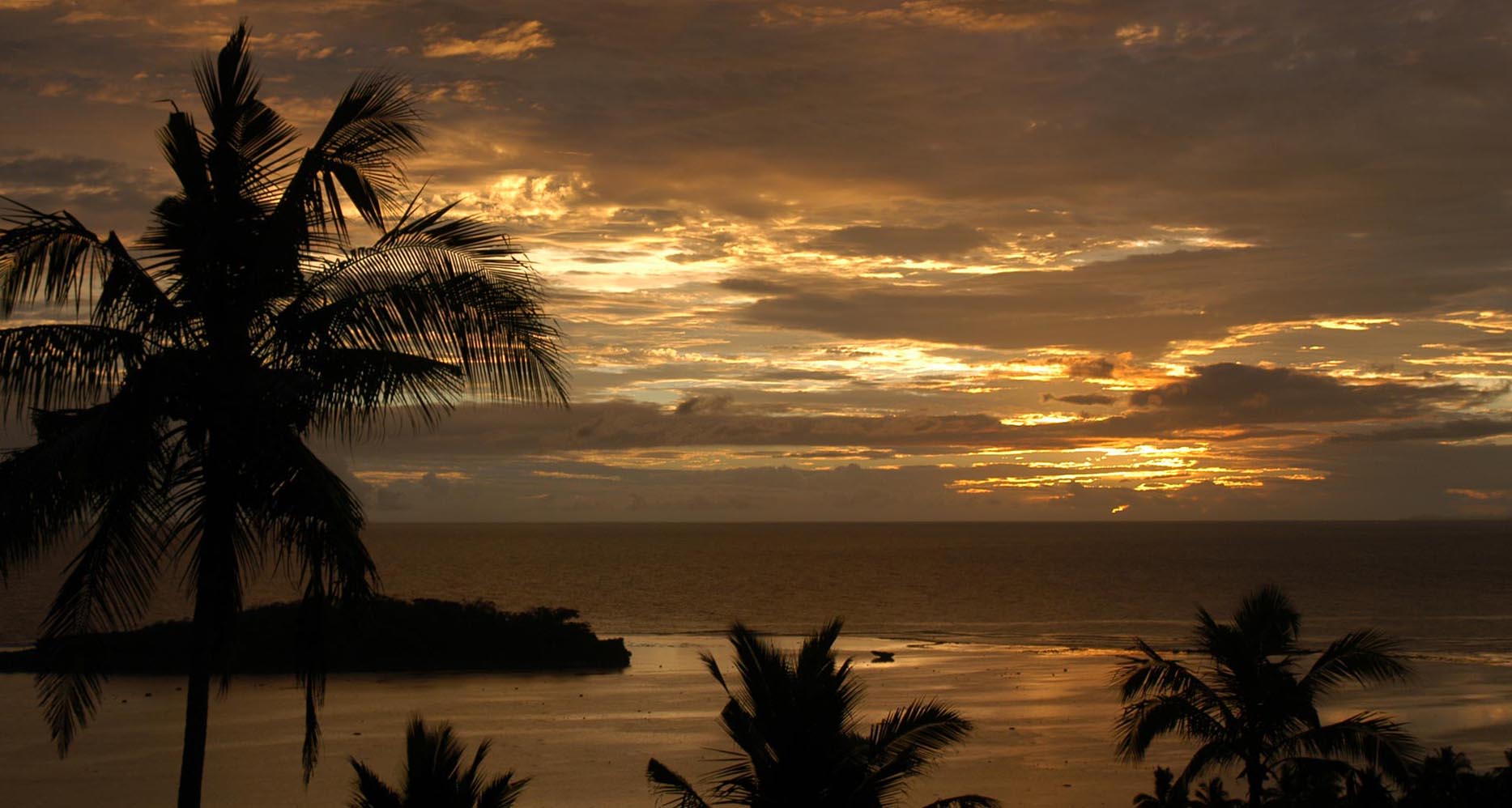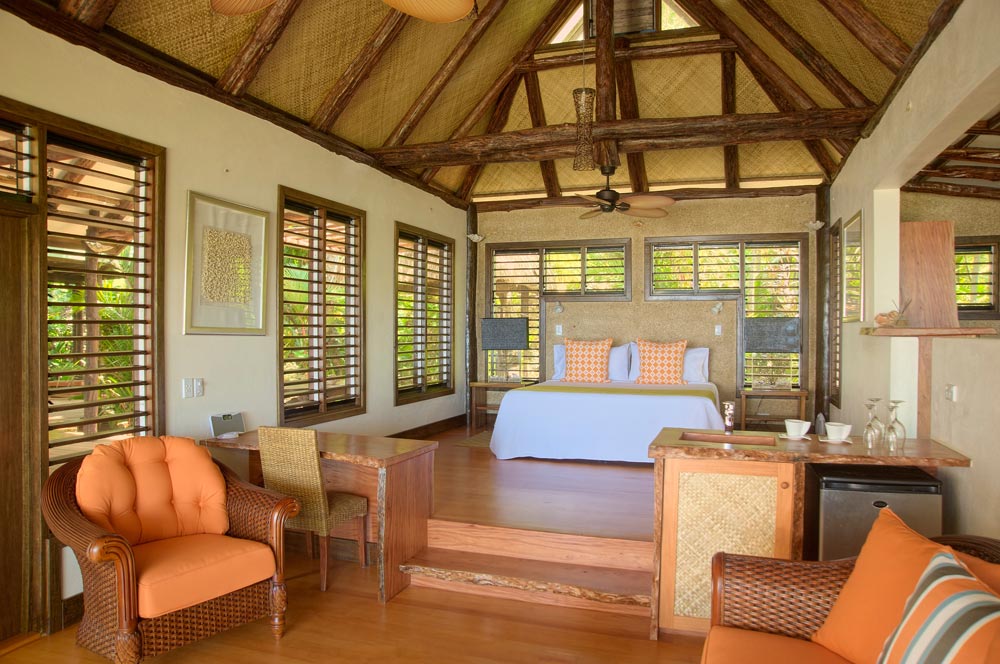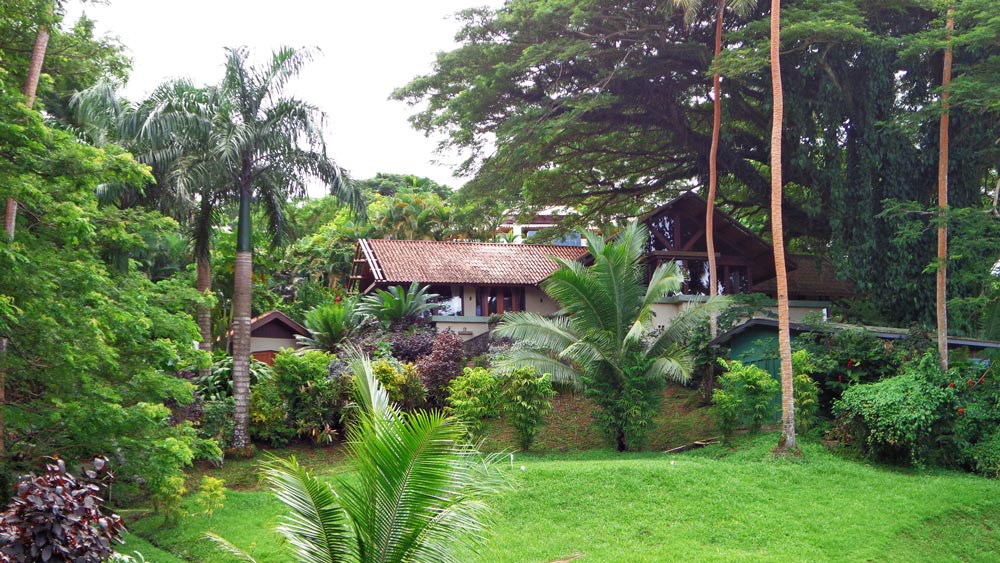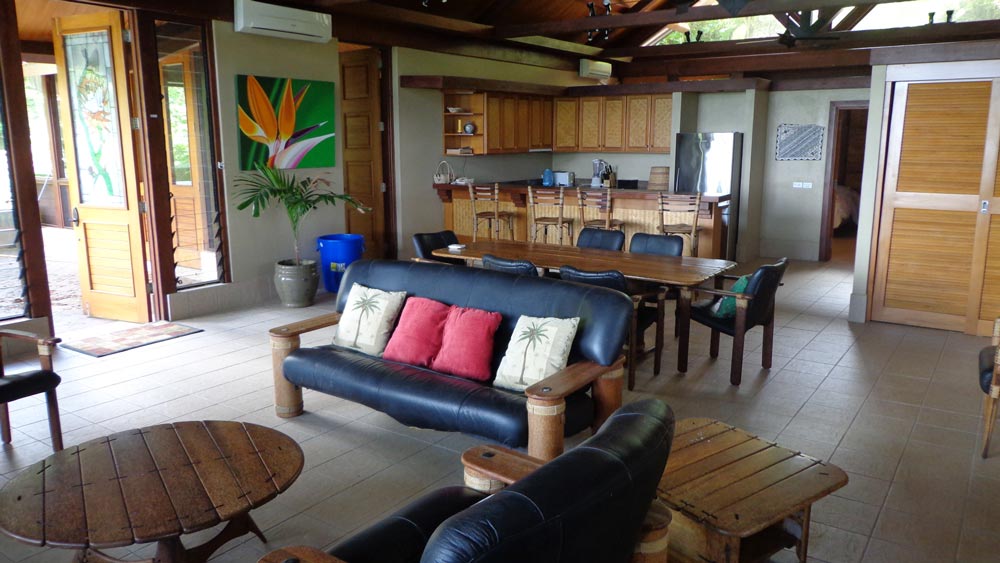Savusavu Fiji
The Hidden Paradise

Whether you arrive by boat or plane, there is a sense of amazement at the stunning beauty of this "hidden paradise" when seen for the first time. The combination of the lush tropical greenery of the surrounding hills and age old volcanic peaks surrounding the turquoise blue waters of Savusavu Bay, makes one feel as though discovering Fiji's "hidden paradise" is a very personal experience.
Often called "The Friendly North", one immediately notices the warmth & friendliness of the people on the streets of Savusavu that often gives that feeling of coming "home". Savusavu is home to a diverse group of Fijians, Indo-Fijians and expats from around the world, giving this little town a feeling of community.
Big smiles and the Fijian greeting "Bula!" is common as you walk along main street whether you are a local or a tourist. Savusavu's easy living atmosphere and friendliness attracts a wide group of ex-patriots from all over the world. Some are "snowbirds" escaping winter for a few months at a time while many others choose to live full time in this island paradise. It is quite common to meet people who have sailed into Savusavu Bay on their boat and decide to stay permanently. Savusavu has that effect on people. Surprisingly, this small town has a lot to offer as it continues to grow and becomes a well known destination for investors and tourists.


The surrounding areas near Savusavu offer the largest concentration of freehold property in all of Fiji. A full range of accommodations including backpacker dormitory, hotels, resorts, private guest bungalows and homes makes it easy to take the time to explore Savusavu and get a feel for living in the area. With the availability of a wide variety of services, Savusavu is on the map as a lovely place to retire or start your own business. With world class diving, deep-sea fishing, sailing, snorkeling, yachting and hiking one does not get bored living in Savusavu. Rotary Club has been instrumental in making improvements in the community and surrounding schools and villages.
The local open air market is full of friendly vendors selling colorful veggies, fruit and fish. Step into one of the handicraft shops and be amazed at what the local Fijian artists can do with the natural resources around them. With several well stocked grocery stores you can find everything you need including "European" foods as well as beer, wines and spirits. Several restaurants cater to many different tastes including Indian, Chinese, traditional Fijian fare, fresh fish and even pizza and sandwiches! If you like nightlife, there are several private clubs where the local expat and yachting community can be found. Often, these clubs have special fund raising activities and parties and the whole community gets involved. Although Savusavu seems worlds apart from wherever you've come from, just check your email from one of two Internet centers and find out what's going on in the rest of the world.
The Savusavu airport has service from Nadi, Suva, Taveuni and other airports in Fiji. The bay provides a calm landing area for seaplanes and buses, taxis and carrier trucks are available for exploring other parts of Vanua Levu by land. Be sure to check out the new Tourist Info Spot located at the Budget Rental Car office, opposite the Post Office on main street Savusavu for more information on local activities and attractions.
Sit on the dock at the marina and drink in the beautiful scenery of Savusavu Bay. Savusavu isn't for everyone but for those people who come to appreciate its uniqueness in the world, there's nowhere else they'd choose to visit or live!


Fiji is a very attractive Pacific Island for those interested in investing in real estate. Opportunities range from buying land and building homes for retirement or holiday retreats to setting up tourism or commodity export businesses.
As one of the only countries in the South Pacific islands that allows foreign ownership of real estate, Fiji is unique. In Fiji, freehold land is available for purchase by foreigners and the largest percentage of available freehold land in the country is located on Vanua Levu, mostly near Savuavu. Foreigners who purchase freehold land in Fiji hold title to their property.
Furthermore, Fiji’s government encourages foreign investment through the Fiji Trade and Investment Bureau (FTIB). The FTIB is a government agency that has set up procedures that are specifically geared to allow and encourage foreign investment in Fiji.
Contact Ki-Maren Real Estate for up to date and accurate information on investing or living in Savusavu.
Frequently Asked Questions about Investing in Savusavu Fiji
The information listed below is deemed accurate at the time of publication, however before investing please consult a solicitor and or accountant. No warranty is either expressed or implied in regards to the following information.
Please note that there is a new law in Fiji (Bill 28) passed in December 2014, regarding land ownership by non-residents. Some of the information below may be different and you should consult with a qualified lawyer or solicitor before purchasing bare land in Fiji.
Q. What is the legal contract for purchasing real estate properties in Fiji?
Any legal contract for purchasing properties in Fiji must be in writing and valid. The common law of contracts also similar to England and USA is to prepare a contract every time one sells or purchases a property. A sales and purchase agreement by the seller that is checked and approved by a certified lawyer prior to signing. For non-residents of Fiji, there are certain requirements that the seller can work through with both parties in order to the contract becoming unconditional. Q. Is there stamp duty payable?
All transfers of properties prior to settlement and leases is payable on stamp duty. Stamp duty on property leases is payable to 1% on annual gross rent and 2% on real estate property.
Q. Is there Capital Gains Tax in Fiji?
There is now a 10% capital gains tax in effect on profits from the sale of homes or property in Fiji.
Q. Can I as a non-resident investor obtain loans from commercial banks in Fiji?
Non-resident investors can obtain loans from commercial banks in Fiji. The maximum loan is handled by the Reserve Bank of Fiji. Most buyers tend to use their own properties in their own country of residence as equity.
Q. Can I use my real estate property purchased as security for a mortgage in Fiji?
Yes, real estate properties can be mortgaged as security for mortgage or debt. Most common mortgage source are banks and financial institutions in Fiji. ANZ Bank, Colonial Bank, and Westpac Bank are the most active in the market a proper and direct contact with the bank of your choice can be made by the seller.
Q. How long does the transaction for a property take?
A property transaction usually takes 60 days. However, delays may occur through government agencies but the seller can assist with attorneys to establish things more easily and effectively until settlement.
Q. Can non-residents invest in a real estate property?
Yes, non-residents can invest in a personal real estate property in Fiji. However, freehold properties that are larger than one acre than approval must be made by the Minister of Lands of Fiji.
Q. What forms of ownership is permitted in Fiji?
Ownership of real estate properties in Fiji can be individuals or more than one person. Businesses and partnerships can acquire, hold and convey real estate properties in Fiji. Partnerships may be more than 20 people with one general partner. Trusts and joint venture can purchase real estate properties in Fiji, as well.
Q. Can a non-resident marketer sell his property to another non-resident purchaser?
Yes, non-residents can sell properties to another non-resident buyers. New developments in Fiji are purchased almost exclusively by non-residents for many purposes. New laws have changed this for properties located within a town area so please check with your realtor before purchasing within the town limits.
Q. Will I need consent from the Minister of Lands Consent if I want to re-sell my property to another non-resident?
Yes, consent is required by the Minister of Lands prior to dealing into a binding contract. This procedure is simply an application form filled and submitted by each party to the Department of Lands for approval. This usually takes from 2 to 8 weeks.
Q. Are there Registered Appraisers in Fiji?
Yes, and most of Fiji’s commercial banks have approved list of appraisers that form the bank’s panel of appraisers.
Q. Can I let other people use my property?
Yes, anyone can use your property with your arrangements. However, it should not be on a commercial basis. If there are intentions of earning income from the property then approval must be received from Fiji Trade Investment Board. The seller can recommend professional accountants to help structure the investment properly.
Q. Where do we go to obtain approvals to set up a business or to earn income in Fiji?
For approval to set up a business in Fiji, foreign investors need a Foreign Investment Registration Certificate from the Fiji Trade Investment Bureau, which encourages investment. This application can take up to 5 to 14 days. The seller can recommend professional accountants to submit and structure your application properly.
Q. Where to go to get work permit(s) to set up a business in Fiji?
Business permits can be obtained from the Department of Immigration, which is responsible for issuing work permits. Any investor seeking a work permit must invest at least $50,000 before they will be considered for a work permit.
Q. Is it difficult to get a work permit?
If all information requested by the Department of Immigration is provided, it will not be difficult to obtain a work permit. Temporary work permits are also issued in a reasonable time. A permanent work permit will not be issued until all requirements are provided, with clear police reports. Application fees and necessary charges apply.
Q. What is the Expat lifestyle like in Fiji?
Unlike most countries, Fiji is more relaxed, as it is not as busy and crowded. The lifestyle is great, and multicultural people reside in Fiji.
Q. What happens on weekends or whilst on holidays?
There is a lot to do on the weekends when one is in Fiji. There are many activities such as swimming, snorkeling, sailing, surfing, fishing, golf, tennis, bowls, exploring, village visits, shopping, and sightseeing to some of the beautiful islands of Fiji.
Q. Is broadband internet connection available in Fiji?
Yes, Broadband internet is available in most locations of Fiji. Vodafone and Digicel now offer 3G and 4G wireless Internet service covering most of the country.
Q. Can non-residents open an external account in Fiji?
Yes, external non-resident accounts can be opened by most banks. They will be able to assist you with this requirement for the comfort of transferring currency overseas for your investment in Fiji.
Q. Are developers subject to Tax on Profit?
Land developers are subject to tax on profit. Profits that are delivered by entities dealing with sale of properties with intentions of making profits are subject to tax. You are generally not considered a land developer unless you have a very large acreage and are selling off different parcels or own several individual properties in Fiji.